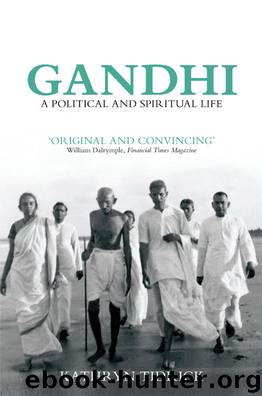Gandhi by Kathryn Tidrick

Author:Kathryn Tidrick [Tidrick, Kathryn]
Language: eng
Format: epub
ISBN: 978-1-78168-239-5
Publisher: Verso Books
Published: 2013-07-02T04:00:00+00:00
He referred to other incidents which had taken place in recent weeks, including the forcible takeover of town halls at Shahajanpur and Jajjar. ‘I have bitter complaints about Jajjar’, he said. But at the time he had praised the local Congress Committee’s occupation of the town hall as ‘audacious and inspiring’, though admittedly ‘fraught with the greatest danger’.162
Chauri Chaura, then, was no bolt from the blue. The campaign was not, as many accounts have it, suddenly ‘marred’ by violence. Nor was Gandhi ignorant of the violence that was taking place. Nor was the campaign stopped ‘on the spur of the moment’ when he heard the news – as Romain Rolland put it in what was to become the orthodox version in 1923.163 The decision to call off the campaign was a painful one, and but for the intervention of others might not have been made.
Once the decision had been taken, and the brakes successfully applied, it was clear to Gandhi that it was the right one. Not only would swaraj not be ‘real swaraj’ if it came through violence, as he had said in his exploratory letter to the Working Committee on 8 February, but the fact was that the campaign had been rapidly slipping out of his control.
The Khilafatists had openly demanded the abandonment of non-violence at the Ahmedabad Congress in December. In Bengal as well as the United Provinces, peasants were refusing to pay rent – the published decision of the Working Committee suspending the campaign explicitly condemned this. In Rajputana there was agitation for non-payment of taxes to the governments of Indian states. Of all the many thousands of new volunteers enrolled, only a few wore khadi or otherwise observed Gandhi’s stipulated code of behaviour. As long as he saw the spirit of non-violence spreading, he said, he would be ‘ready to run many risks’; but he could not allow his movement to be exploited by other people.164 Suspending the campaign gave him the opportunity to reassert control.
But first there had to be a fast, and this took place from 12 to 16 February. The intention at first was to go without food for 14 days, but in acknowledgement of others’ concern, Gandhi ‘let it be five days’.165 Later he said that five days had not been enough. The fast had a deliberate air, as though his conscience had already been relieved by calling off the campaign, but he had some further points he wished to make. He felt ‘stronger’, he wrote on the eve of the fast, for having confessed error: confession was ‘like a broom that sweeps away dirt and leaves the surface cleaner than before’. Fasting would continue his purification and make him ‘a fitter instrument able to register the slightest variation in the moral atmosphere’. The fast was also intended as a punishment of those who had committed violence in his name, and as a ‘warning’. He believed, he said, that the country wanted him to live. If so, ‘it should not deceive me.
Download
This site does not store any files on its server. We only index and link to content provided by other sites. Please contact the content providers to delete copyright contents if any and email us, we'll remove relevant links or contents immediately.
Fanny Burney by Claire Harman(26588)
Empire of the Sikhs by Patwant Singh(23064)
Out of India by Michael Foss(16838)
Leonardo da Vinci by Walter Isaacson(13300)
Small Great Things by Jodi Picoult(7108)
The Six Wives Of Henry VIII (WOMEN IN HISTORY) by Fraser Antonia(5492)
The Wind in My Hair by Masih Alinejad(5084)
A Higher Loyalty: Truth, Lies, and Leadership by James Comey(4942)
The Crown by Robert Lacey(4795)
The Lonely City by Olivia Laing(4793)
Millionaire: The Philanderer, Gambler, and Duelist Who Invented Modern Finance by Janet Gleeson(4455)
The Iron Duke by The Iron Duke(4341)
Papillon (English) by Henri Charrière(4247)
Sticky Fingers by Joe Hagan(4179)
Joan of Arc by Mary Gordon(4087)
Alive: The Story of the Andes Survivors by Piers Paul Read(4013)
Stalin by Stephen Kotkin(3949)
Aleister Crowley: The Biography by Tobias Churton(3626)
Ants Among Elephants by Sujatha Gidla(3452)
